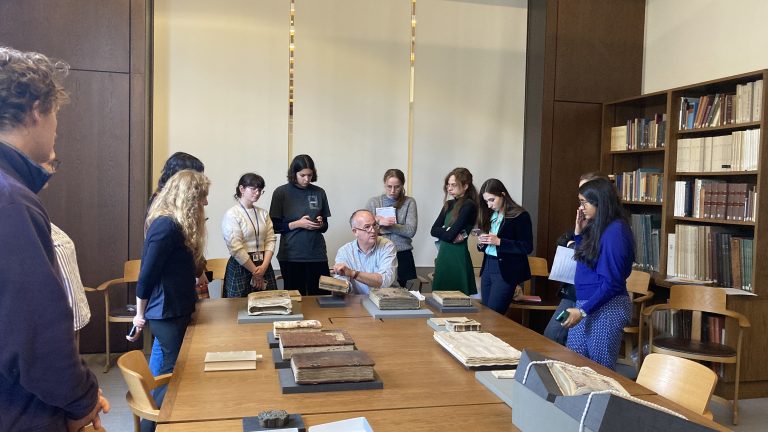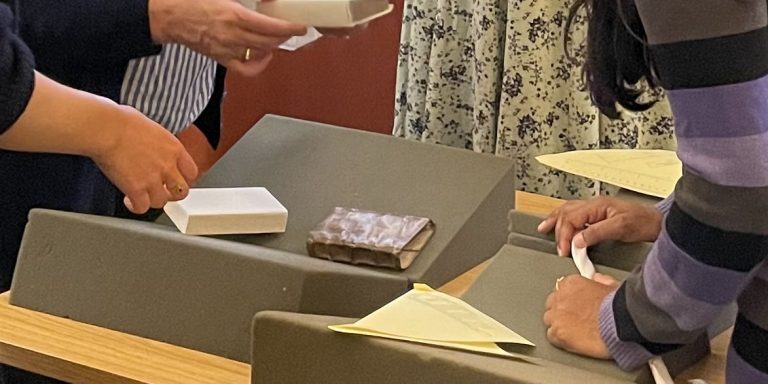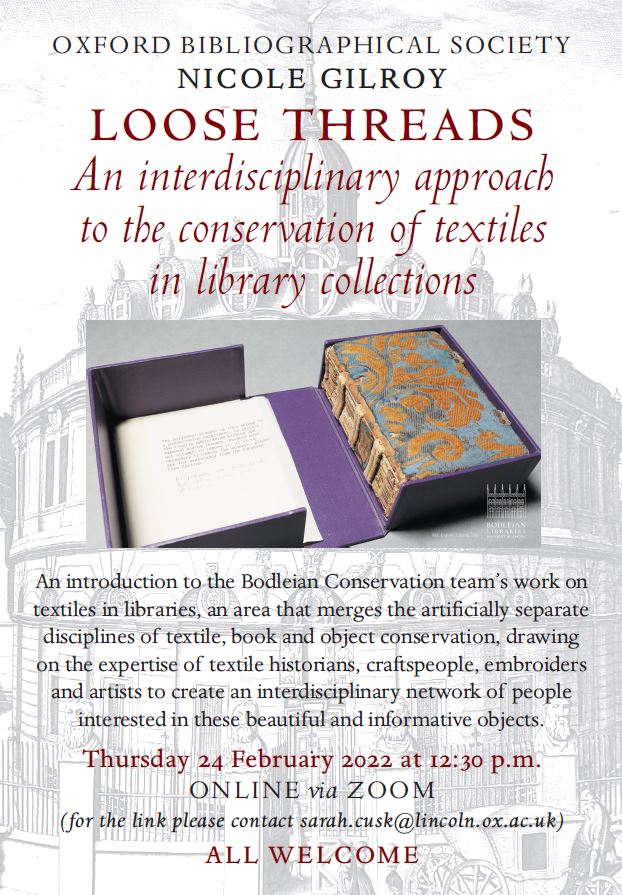by Christopher Summers In 1908, a children’s book version of the Nibelungenlied in a retelling by Franz Keim was published with illustrations by Carl Otto Czeschka. While the book has been largely forgotten, the striking visual language of Czeschka has proven to be of lasting influence. In the blog post, I am going to highlight …
Category: Uncategorized
Structures of the Manuscript, or What Makes a Book
By Ksenia Dugaeva In our ‘Structures of the manuscript book’ seminar last week, we continued our foray into understanding how manuscripts come together – focusing in this session on the journey from sheet to codex to bound book. All of us browse, read, and generally handle books in our daily and academic lives, and a …
Can you tell it’s a book from the cover?
In the first week of the History of the Book methods option, students and researchers gathered in the Taylor Institute Library to explore items from the special collections that challenge the very notion of the ‘book’. From the curious collection of printed and handwritten manuscript pages rebound in Arch.Fol.It.1478(1) where Petrarch’s ‘sonetti et cançone’ are …
Treasures of the Taylorian
A tour by Emma Huber and Henrike Lähnemann for Meeting Minds More information: http://blogs.bodleian.ox.ac.uk/taylorian and https://historyofthebook.mml.ox.ac.uk/ Watch the 2021 online version of the tour on youtube: The library has 55 incunables 1,359 titles from the 16th century 3,447 from the 17th century, 10,442 from the 18th century and c. 41,800 from the 19th century. Notable …
Digital Editions Community of Practice – Trinity Term 2022
Taylor Institution Library Room 2Thursdays 1pm–2pm, even weeks, Trinity Term 2022 Each session will include a brief talk, followed by an opportunity for discussion. Hot water, tea, coffee, milk and biscuits will be provided. Please feel free to bring your own lunch (and a mug for the hot drinks!) Programme Week Two (5th May): Textual …
(24 Feb, 12:30) Loose Threads. An interdisciplinary
When? – Thursday 24 February 2022 at 12:30 p.m.Online via ZOOM(for the link please contact sarah.cusk@lincoln.ox.ax.uk) An introduction to the Bodleian Conservation team’s work on textiles in libraries, an area that merges the artificially separate disciplines of textile, book and object conservation, drawing on the expertise of textile historians, craftspeople, embroiders and artists to create …
Digital Scholarly Editing
In collaboration with Digital Scholarship@Oxford (DiSc) and the Digital Hub at Jesus College, the Oxford Centre for Textual Editing and Theory (OCTET) is organising a brief introduction to Digital Scholarly Editing on 2 November 2022 (5pm – 6pm) at Jesus College’s Ship Street Centre (University of Oxford). The speakers are Emma Huber and Joshua Schäuble. …
An Appeal for Annotations: Alfonso de Palencia’s ‘Vidas Paralelas’
After an eventful life as a chronicler, translator, and lexicographer in the turbulent world of 15th Century Spain, Alfonso de Palencia settled down in Seville to produce what would be one of his final published works. Born in 1423, he spent ten years of his youth studying in Italy alongside some of the most prominent …
Movable Type
Part 1 of: Printing an anniversary card for Sebastian Brant at the Bodleian Bibliographical Press Agnes Hilger A snippet from my school knowledge memorised some time ago: Johannes Gutenberg invented “letterpress printing with movable type”. As is so often the case with such facts, I didn’t really think about it much at the time and just put it …
Come Live Edit a Blog Post! ‘In Search of an Apostle: Uncovering the Roots of the Taylorian Janua with Digital Methods’
In this session, we are going to transform an academic paper into an academic blog post, closely examining the opportunities and challenges afforded by this medium of communication. (1) Methodological: Digital methods can aid us in our book historical research by (a) expanding the community of scholars with whom we engage and (b) expanding and reshaping the archival …








